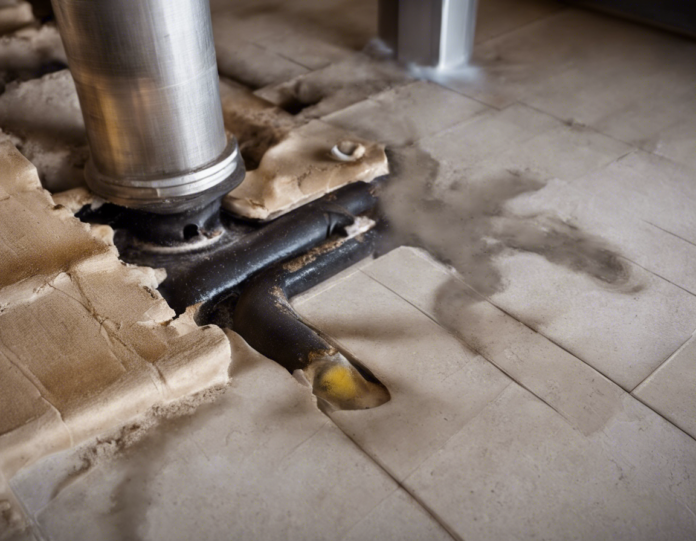Gas leaks can pose a serious threat to safety and well-being in any environment. Whether in a residential, commercial, or industrial setting, detecting gas leaks promptly is crucial for preventing potential disasters. Gas leaks can occur due to damaged pipelines, faulty appliances, poor ventilation, or improper installation. It is important to educate oneself and others about the warning signs that indicate a potential gas leak. Recognizing these signs early can help avoid dangerous situations and allow for timely intervention.
Common Types of Gas Leaks
There are several types of gases used in homes and workplaces, such as natural gas, propane, carbon monoxide, and methane. Each of these gases poses its own set of risks if a leak occurs. Some common warning signs to watch out for include:
Rotten Egg Smell
Natural gas and propane are odorless in their natural state, but gas companies add a chemical called mercaptan to give them a distinct rotten egg smell. If you detect this odor, it could indicate a gas leak.
Hissing Sounds
A hissing or whistling sound near a gas line, appliance, or tank may indicate a leak. This sound is produced by the gas escaping from the source.
Dead or Dying Plants
Indoor plants near a gas line might show signs of distress, such as wilting leaves or unusual discoloration, due to exposure to gas leaks.
Physical Symptoms
Exposure to gas leaks can cause symptoms like dizziness, nausea, headaches, fatigue, or breathing difficulties. If multiple people in a confined space experience these symptoms simultaneously, it could indicate a gas leak.
Bubbles in Water
If you notice bubbling in standing water near a gas line, it might indicate a leak. Gas escaping from the line can cause the water to bubble.
How to Detect Gas Leaks
Beyond the warning signs, there are several methods you can employ to detect gas leaks in your surroundings. These methods include:
-
Visual Inspection: Check for damaged pipes, loose fittings, or hissing sounds near gas lines.
-
Electronic Gas Detectors: These devices can be installed to detect gas leaks early on, providing an added layer of safety.
-
Soapy Water Test: Applying a solution of soapy water to gas lines and connections can help identify leaks through the formation of bubbles.
-
Gas Detection Sprays: Certain sprays and solutions can be used to detect leaks by changing color in the presence of gas.
-
Carbon Monoxide Detectors: Install carbon monoxide detectors in your home or workplace to alert you of any leaks promptly.
Safety Precautions
If you suspect a gas leak, it is crucial to take immediate action to ensure the safety of yourself and others. Follow these safety precautions in the event of a gas leak:
-
Evacuate the Area: If you suspect a gas leak, evacuate the premises immediately and move to a safe location.
-
Avoid Flames or Sparks: Do not operate any electrical switches, lighters, or appliances, as gas leaks can be highly flammable.
-
Ventilate the Area: Open doors and windows to allow the gas to dissipate safely from the area.
-
Contact Authorities: Call your local gas company or emergency services to report the leak and seek professional assistance.
-
Do Not Return: Do not return to the premises until authorities have confirmed that it is safe to do so.
FAQS:
Q: What should I do if I detect a gas leak in my home?
A: If you suspect a gas leak, evacuate the area immediately, avoid using any electrical switches or appliances, ventilate the area by opening doors and windows, and contact your gas company or emergency services.
Q: How can I prevent gas leaks in my home?
A: Ensure regular maintenance of gas appliances, install carbon monoxide detectors, conduct annual gas inspections, and educate family members about gas safety measures.
Q: Are gas leaks always accompanied by a smell?
A: Natural gas and propane are odorless; however, gas companies add a distinct odor to aid in detection. Other gases like carbon monoxide are odorless and colorless, making them harder to detect without proper equipment.
Q: How often should gas appliances be inspected?
A: Gas appliances should be inspected annually by a qualified professional to ensure they are in good working condition and do not pose a risk of gas leaks.
Q: Can I use gas detection sprays to check for gas leaks myself?
A: Gas detection sprays can be a useful tool in detecting gas leaks at home. These sprays change color in the presence of gas, providing a visual indication of leaks.
By staying vigilant and familiarizing yourself with the warning signs and detection methods for gas leaks, you can help ensure the safety of yourself and those around you. Remember that prevention is key, and taking proactive measures to address gas leaks can go a long way in protecting your home or workplace from potential hazards.
